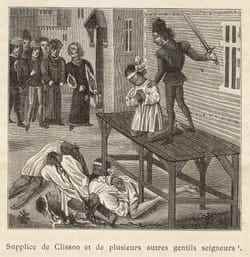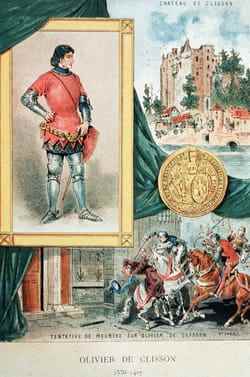Nicknamed “the Breton Tigress”, Jeanne de Belleville was a noble lady of the 14th century. For several months, she harasses the ships of the King of France following the summary execution of her husband. A scenario worthy of an episode of Game of Thrones.
In 1343, Olivier IV de Clisson, husband of Jeanne de Belleville, was invited to the wedding of the son of the King of France. As soon as he arrived, he was arrested and accused of high treason, then beheaded. His head is exposed on the ramparts of Nantes. Drunk with rage, Jeanne de Belleville swears revenge. She first harasses the Breton supporters of the king, plunders half a dozen castles and massacres his subjects. Banished from the kingdom, his property and lands were confiscated from him. She decides to go to sea accompanied by her supporters and buys a ship she names my revenge. Jeanne de Belleville reaches England where she finds material support and two additional ships. Thus armed, she skims the rivers and the coasts of Brittany. As soon as it crosses a French boat, it launches the collision, plunders and makes kill the whole of the crew. In a few months, she earned the nicknames of bloody lioness and of Breton tigress. It arouses both fear and admiration. But Jeanne de Belleville does not fight strictly speaking during these attacks, it seems rather that she gives orders. She derives no personal enrichment from these lootings and uses the money collected to pay her crew. Moreover, the support of the King of England made her a women corsair rather than a pirate. The fact remains that the determination and bravery of this woman make her an extraordinary feminine personality of the Middle Ages. His incredible adventures are to be discovered on France 3 on Monday April 25, on the occasion of the broadcast of an unpublished episode of Secrets of history entitled Jeanne de Belleville, pirate for love.
Born around 1300, Jeanne de Belleville grew up in a noble and wealthy family. Married for the first time around the age of 12, her husband died a few years later. She marries the chosen one of her heart, Olivier IV of Clisson, Breton nobleman and great merchant, with whom she has five children. Her life was turned upside down in 1643 when her husband was executed by order of the King of Francein the context of a succession dispute in Brittany and tensions with the King of England. Joan takes up arms and attacks the king’s Breton supporters before embarking at sea and harassing the merchant ships of Philip VI of Valois. About to be captured, Joan the pirate finds a rowboat that drifts for days. His youngest son dies, but the canoe manages to reach the coast. She finds refuge in England with her family and actively participates in decision-making meetings concerning Brittany. She married Sir Walter de Bentley, the king’s lieutenant, which allowed her to recover her lands in France and acquire new ones. Jeanne de Belleville died in 1359, probably in England, as a respected, admired and powerful lady.
The youth of Jeanne de Belleville and her happy marriage
Jeanne de Belleville was born around the year 1300 in Belleville-sur-Vie, in Poitou (now Vendée), and grew up in a noble family. His parents are Létice de Parthenay and Maurice IV de Montaigu, Lord of Belleville and Palluau. An only child, she is the heiress of a great fortune from the salt trade. She is very young bride to a wealthy Breton nobleman, Geoffroy, lord of Châteaubriant who died in 1326. But Jeanne de Belleville maintained an affair with Olivier IV of Clisson, a Breton nobleman and a great merchant, with whom she had an illegitimate first daughter, Ysabeau, who died in infancy. Olivier de Clisson in turn became a widower and the couple married in 1330. Joan of Clisson, she thus joined one of the most important families of medieval Brittany. This love marriage gave birth to four other children: Maurice, Guillaume, Olivier (future constable of France) and Jeanne. Her husband left her a great deal of autonomy, she administered her various estates herself, such as Noirmoutier and the Île d’Yeu. She seeks to limit sexual violence on her land by encouraging the creation of brothels in Nantes. She is described as very beautiful, slim and athletic. The couple administers a vast territory, more or less representing the current Loire-Atlantique.
Execution of Olivier de Clisson during the War of Succession in Brittany

The 14th century is marked by the beginning of the GaHundred’s wander Years in 1337 opposing France to England but also by the succession dispute around the Duchy of Brittany. Two suitors dispute the duchy, Jean de Montfort, half-brother of the deceased, and Jeanne de Penthièvre, his niece and wife of Charles de Blois, nephew of the king of France. Consequently, it is supported by the French sovereign while Jean de Monfort is allied with Edward III of England, rival of the king of France. The husband of Jeanne de Clisson decides to support the claims of the Blois-Penthièvre clan.
Olivier de Clisson was taken prisoner by the English in 1342 during the siege of Vannes and then released for a small ransom, which earned him the suspicion of having fraternized with the enemy. He falls into disgrace in the eyes of King Philippe VI of Valois. Invited to a major tournament organized in honor of the marriage of the son of the King of France, he is accused high treason during the festivities. On August 2, 1343, Olivier de Clisson was sentenced to death without trial. Humiliated, beheaded and hanged, the lord of Clisson saw his head exhibited above the Sauve-Tout gate, on the surrounding wall of the city of Nantes. The tragic and violent death of her husband test Jeanne de Belleville. Drunk with rage, she nevertheless goes to Nantes to show her sons, Olivier and Guillaume, the cruel fate reserved for their father. Alongside her children, Jeanne de Belleville swears revenge on the king of France and slaughter his followers. Thus was born the legend of the tigress or the Breton lioness.
From ruthless Breton tigress to medieval pirate woman
Jeanne de Belleville recovers her husband’s head by replacing it with another. She dresses as a man, mobilizes all his fortune and is destined for war. She rallied several lords, Breton knights and even sailors to her cause. She knows how to sail, has a certain natural authority, but above all her husband was appreciated and the Bretons are outraged by this summary execution. She then begins a series ofpunitive expeditions against the Breton lords loyal to the King of France. She plunders and decimates the inhabitants of many castles. However, Philip VI could not intervene because of the Truce of Malestroit signed with the King of England as part of the Hundred Years War. The King of France therefore preferred to confiscate Joan’s property and banish her from his lands. For each extortion on his part, he executes Joan’s bannermen one by one.
Jeanne de Belleville chooses toto harass the king on another ground: the sea. While the troops of the latter arrive on his lands to besiege his castle, Jeanne has relieved herself of all her possessions in order to acquire a ship which she names my revenge. Accompanied by her two young sons, she set sail for the British coast. The English king, Edward III, gave him his support and provided him with other ships. At their head, she attacks any ship displaying a fleur-de-lis. She approaches and plundered French ships who have the misfortune to cross his path. These attacks made her famous throughout the Kingdom of France, she was then nicknamed the Breton tigress or the bloody lioness.
Last adventures of Jeanne de Belleville and her exile in England

In 1345, tired of Joan’s attacks, the King of France ordered that the Channel be raked in order to definitively eliminate this disturbing element. He succeeds one stormy day, Jeanne de Belleville finds herself cornered by six king’s ships. She resolves to abandon her crew, and takes with her her two sons and a few men aboard a boat. Their drift craft for six days, her youngest son, Guillaume, dies and she is forced to throw his body into the sea. They end up reaching the coast of Brittany near Morlaix, a town favorable to the Montfort clan. She joins forces with Jeanne de Flandre, wife of Jean de Montfort, and decides to have him escape from the Louvre where he has been imprisoned by the King of France for four years. The escape succeeds but unfortunately he dies soon after in England. The two women go into exile for theEngland accompanied by their children, where they are under the protection of Edward III. The young Olivier, close to the king, was knighted a few years later. He will become Constable of France. He is the most famous member of the Clisson family, notably for his cruelty in combat, which earned him the nickname of butcher.
The death of Joan of Belleville in England
Jeanne de Belleville devoted the last part of her life to trying to recover his property and lands confiscated by the King of France. She meets Sir Walter of Bentley, the king’s lieutenant in Brittany, while she actively participated in strategic meetings concerning this region. She takes him as her last husband around the year 1349, which allows her to recover her lands and to be offered other domains. Jeanne de Belleville died in 1359, probably in England, a respected and powerful lady. All her life, she followed the motto of her coat of arms: For what pleases me.
Works in homage to Jeanne de Belleville: film and books
From noble lady to avenging warrior, then pirate of the coasts of Brittany and Normandy, the incredible life by Jeanne de Belleville inspired a series of books, a film and a short film. The works Jeanne De Belleville, The Breton Tigress by Elie Durel and Jeanne de Belleville, the filibuster heart by Isabelle Pellé are inspired by her life. A descendant of Jeanne, Astrid de Belleville, devoted a research dissertation to her. In 2022, an episode of Secrets of History entitled Jeanne de Belleville, pirate for love is dedicated to him. An indomitable figure, little known to the general public, Jeanne de Belleville was an extraordinary female personality of the Middle Ages.
